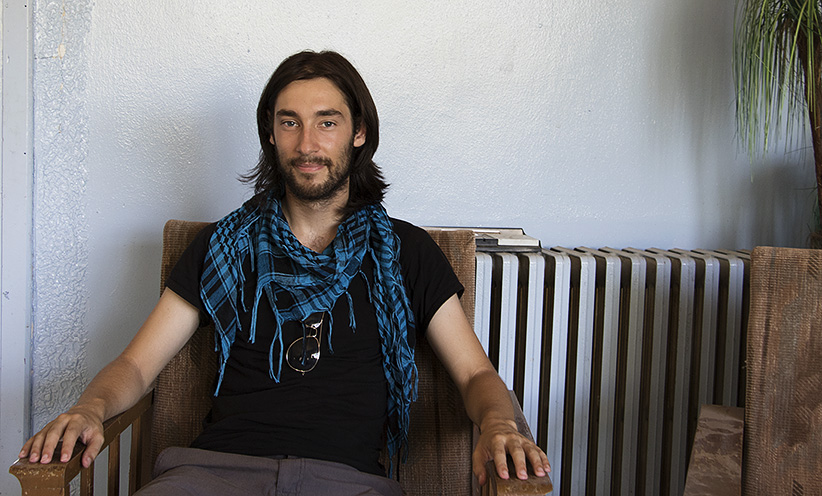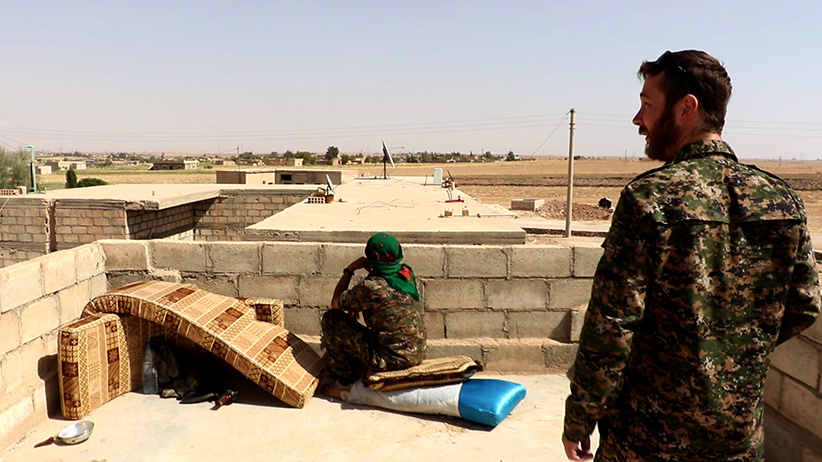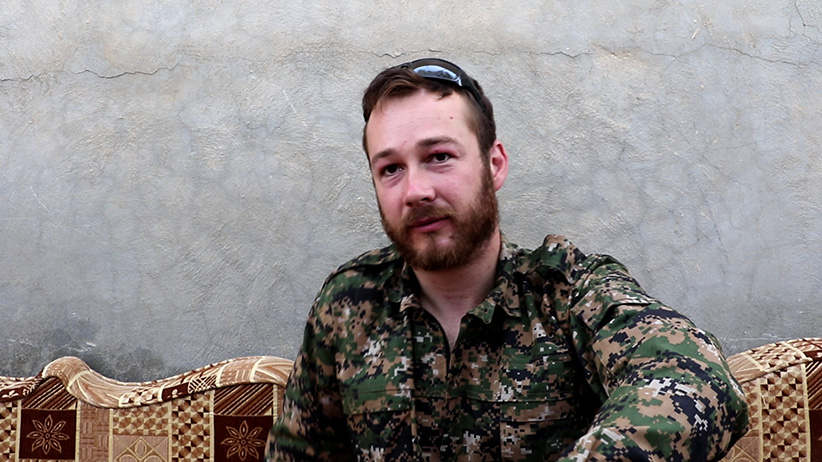A tale of two Canadians, fighting Islamic State
How an intellectual from B.C. and a warrior from Ontario both ended up fighting Islamic State on the front lines
(Photograph by Adnan R. Khan)
Share
The sounds of mortars exploding and the rapid rat-a-tat-tat of machine-gun fire is music to John Gallagher’s ears. “They’re close,” says the 31-year-old native of Windsor, Ont., edging forward slightly. “That’s the closest I’ve heard them from this position. Sounds like they’re 200 metres away. We may have to cut this interview short and make a run for it.”
Lounging on a cushion in an abandoned house on the southern outskirts of Hassakeh city in northern Syria, the former infantryman with the 2nd Battalion of the Princess Patricia’s Canadian Light Infantry looks surprisingly unconcerned, considering he’s talking about militants from the so-called Islamic State, the same group that has burned a Jordanian pilot alive and regularly executes any enemy fighters it captures.
Indeed, for him, the proximity of Islamic State militants doesn’t elicit feelings of fear or concern, but rather, frustration. He’d prefer to be part of the battle than sitting in the midst of it, doing nothing. “I fought with the peshmerga for two months,” he says, referring to the Kurdish militia in Iraq’s autonomous Kurdistan region. “We were pushing out the front line near Kirkuk, taking some villages away from [Islamic State]. We came under fire, got to return fire, got to watch some air strikes blow them up. It was good fun.”

Eighty kilometres to the north of Hassakeh, in Qamishli, a city on the Syrian-Turkish border, Islamic State, known locally as Da’ish, or ISIS, or simply “the terrorists,” are no more than a distant shadow. Qamishli has remained a relatively stable place over the four years of the Syrian civil war, where Kurdish fighters with the Peoples’ Protection Units, or YPG, share a tremulous peace alongside forces loyal to the Syrian regime. Here, in a small park in a neighbourhood controlled by the Kurds, another Canadian, Cody Bergerud, is taking a break from the front lines, surrounded as he is by the sound of birdsong rather than live fire.
Bergerud, a 26-year-old political philosophy major from Saltspring Island, B.C., has been in Syria for four months, having travelled the same smuggling route Gallagher took across the border from Iraq to join the Kurds in their revolutionary project. Before coming, he had never held a gun in his life.
“I do carry a weapon now,” he says, “and I know how to use it, but I haven’t had to use it yet.”
For him, fighting Islamic State is only a temporary phase in the long-term transformation of the Middle East, a small chapter in the grand narrative of the socialist struggle against the forces of capitalism and fascism, of which the Kurds are the vanguards, as they seek to carve out their own homeland. “I wouldn’t have expected to find this here,” he says of the Kurdish revolutionary project, “but when I read about it, I had to come and find out if this is the case.”
Bergerud shipped out of Canada in April and went straight to northern Syria, where he received basic military training, but put his efforts into medical assistance, working as a medic in a hospital near the front lines.
Gallagher and Bergerud are about as different as any two people can be: The wiry, intellectual, leftist Bergerud sports shoulder-length hair and relishes a good debate; the conservative Gallagher prefers the short crop of the soldier and is always on the lookout for a good fight. Bergerud views Islamic State as a product of the sociopolitical history of the region, a fascist movement with all the hallmarks of nationalist fervour that inspired the Nazis and Mussolini’s National Fascist Party; Gallagher sees Islamic State as simply an incarnation of evil that must be fought.
Under any other circumstances, the two would find themselves on the opposite sides of most conflicts, intellectual or otherwise. Gallagher can’t stand leftist pacifism and intellectualism. He left a master’s program because of it, he says, and chides his alma mater, York University, for being “a place crawling with socialists.” Bergerud’s life has been firmly rooted in anarchist politics for years. He embraces armed struggle, but only in its capacity to emancipate, not confront.
Only in Syria could the two find common cause. Like so much else in this war, the horror of Islamic State is forging the most unlikely alliances. The U.S. is tacitly supporting Iranian fighters in Iraq; Syria’s Western-backed secularists are fighting alongside ultra-orthodox Salafi Muslims supported by Saudi Arabia. And, in the Kurdish-controlled areas of northern Syria, foreigners from France, Italy, the U.S. and Canada, among others, have banded together in an eclectic blend of warriors, revolutionaries, adventurers and war tourists, to back a struggle many only vaguely understand.
Only a handful of Canadians have joined the cause, but their backgrounds range from a 67-year-old ESL teacher to a 46-year-old former model who joined the YPJ, the all-female counterpart to the YPG, after watching a video posted on social media by John Maguire, the Ottawa native and Islamic State propagandist.

The road into the war for foreign fighters is more or less the same. “It was surprisingly easy,” says Gallagher. “There are a couple of websites for volunteers who are trying to get over here. I sent identical emails to both the Lions of Rojava in northern Syria, and a website that’s now defunct but was recruiting for the peshmerga in Iraq. The peshmerga happened to respond first. They provide you with a contact in-country, then you basically buy your ticket, get over here, and they put you in the fight.”
Gallagher first arrived in early May, after selling his car to fund the trip. (A crowdfunding campaign he launched didn’t go very well, he says.) Since then, he has been shuttled from front line to front line, chasing the battle against Islamic State. He spent Canada Day getting himself smuggled across the Tigris River separating Syria’s Kurdish region from Iraq in a rubber dinghy, then joined up with other foreign fighters embedded with the YPG.
“The front line in Iraq is basically secure now,” he says. “Da’ish isn’t getting through there without heavy losses, so they’re not going to attack. Once I realized that, I was like, ‘Well, I guess I don’t need to be here anymore. Where’s the fight happening now?’ So I got in touch with the Lions of Rojava again and came here.”
“Here” is the front line in the YPG’s fight against Islamic State in Hassakeh. Gallagher’s post, a gutted concrete home surrounded by a two-metre-high perimeter wall, sits only a few hundred metres from Islamic State positions. When he arrived on July 18, along with two other fighters from the U.S. and an Italian, as well as half a dozen Kurdish fighters, the front line was so fluid, Islamic State militants had likely occupied the same place only days earlier. But now, the YPG has the militants on the run, though Gallagher is somewhat perplexed by their success.
“They’ve got a lot of good fighters; they’ve got a lot of heart,” he says. “But there’s a culture shock. Nobody has the kinds of weapons proficiency we’re used to seeing from a conventional army. Things are more ad libbed, like, whatever works, just do it. They use smaller teams, less ammunition. They do things like clearing a building with just two people; that’s just not something we train for in Canada. You see it and think: That’s just nuts! I can’t imagine myself doing that. But they’re winning.”
Related: How a ragtag army is beating back Islamic State in Syria
Less successful, says Bergerud, is the social revolution. “There are some big missing pieces,” he says. “The war is putting so much pressure on the system, because resources can’t go into building infrastructure. Around 70 per cent of resources are going into the war effort, which means things like schools and hospitals and economic structures are not being built.”
Last week, the socialist project received another blow, when Turkish forces were drawn into the conflict in the wake of a July 20 suicide attack in the southeastern Turkish town of Suruc. It was blamed on an Islamic State bomber, who killed 32 people. Turkey condemned the attack and has since begun bombarding Islamic State positions in Syria.
At the same time, Turkish authorities accuse the YPG of having direct links to the banned Kurdistan Workers Party, or PKK, against which it has fought a civil war for the past three decades. The Turks accuse Syria’s Kurds of importing the PKK’s brand of socialist struggle into northern Syria, threatening Turkey’s own stability. Turkish warplanes have also begun to hit PKK positions in northern Iraq and, on July 27, YPG commanders complained that Turkish tanks had fired on their positions inside Syria.
Turkey’s military denied the claim, but the ripple effect from Turkey’s active participation in the Syrian war could undermine the entire revolutionary project in Syria, Bergerud warns. “Turkey would like nothing more than to see this revolution fail,” he says. Moreover, the active military involvement of the Turks poses some serious problems for Western governments, which have largely supported the Kurds in both Syria and Iraq.
Canadians like Bergerud and Gallagher increasingly find themselves entangled in a complex geopolitical dance that could at any time prove deadly. A few weeks ago, they faced the possibility of death at the hands of Islamic State, but, in the coming weeks, may have to contend with a potentially more deadly enemy in Turkish warplanes and artillery positioned at the Syrian border.
The Harper government has warned Canadians to avoid joining the YPG in Syria or the peshmerga in Iraq, advising them instead to enlist in the military. But volunteers who have returned to Canada say authorities are more supportive than they make out to be publicly. In one case, Brandon Glossop, a former armed forces member who returned from fighting with the YPG in mid-May, told the National Post that, when he told a border official where he had been and what he was doing, the officer simply shook his hand and welcomed him home.
But, according to Bergerud and Gallagher, foreign interest in the war is on the wane, with the number of foreign fighters dwindling to 90 from an estimated 300 in the spring, Bergerud says. The numbers are impossible to independently verify, but the downward trend does reflect the realities on the ground. Fighting in Syria, particularly during the summer months, is an exercise in willpower. With temperatures soaring into the mid-40s and supplies consistently low, fighters on the front lines face a constant battle against hunger and fatigue. Foreigners like Gallagher have it especially rough: The YPG uses them as utility fighters, constantly moving them between front lines, wherever the fighting is most intense.
Tiger Sun, the Canadian model turned warrior from Vancouver, left the YPG in late June after suffering health problems, telling the U.K.’s Daily Mail that months of poor diet had taken a physical toll. Others have dabbled in the war, but found it to be less adventurous than they had hoped, and left.
“It’s a problem,” Gallagher says. “The YPG offers to pay your flight home if you come and fight with them, but a lot of people come for a few weeks, realize it’s not for them, and then leave, expecting a free ticket home.”
To counter the problem, the Kurdish leadership has instituted a system whereby new foreign recruits are required to sign a contract before they are accepted into the YPG ranks. Expectations are relatively straightforward, Gallagher says: a minimum six-month commitment, refraining from alcohol and drugs, and respecting the chain of command.
“The unwritten rules are a little more surreal,” he adds, “like not washing your feet in front of women, or not showing bare arms. That’s a tough one, considering the heat.”
Tougher still are the days to come. At his front-line post in Hassakeh, Gallagher says he’s prepared to keep up the fight, as long as it takes to wipe out Islamic State. “I’m in this for the long haul,” he says. “I’m not getting paid a dime, but my ex-military buddies are starting to come through with donations to my fundraising campaign. They understand what this is all about. Da’ish are pure evil; I think it’s my duty to do what I can to defeat them.”

On this day, however, he will have to wait. After the fighting with Islamic State settles down into the occasional burst of machine-gun fire, Gallagher climbs onto the rooftop of the abandoned house to survey the damage. A plume of smoke rises from a cluster of abandoned mud-brick homes no more than 200 m away. “That’s where the fight must have been,” he says, sounding deflated. “Oh well, I’ll get my chance next time.”
Back in Qamishli, Bergerud leaves the park and joins a group of Kurdish activists in a YPG meeting hall nearby. Posters of Abdullah Ocalan, the founder of the PKK, smile down on small groups of teens and tweens gathered around their tables, drinking energy drinks and smoking cigarettes.
Rejeng Abdul Kareem Abdo, a 27-year-old former economics student, complains that Sunni Arabs and Shia Alawites aligned with the Assad regime are the biggest threat to Syria. “We have no choice but to break away from them,” he says.
Bergerud counters that the revolution should be for everyone, regardless of ethnicity or creed.
Abdo is unimpressed. “You foreigners don’t understand what it’s like here,” he retorts. “Syria is broken; it can never be made whole again.”